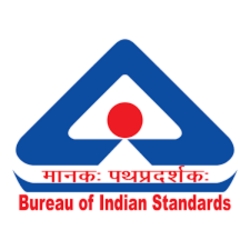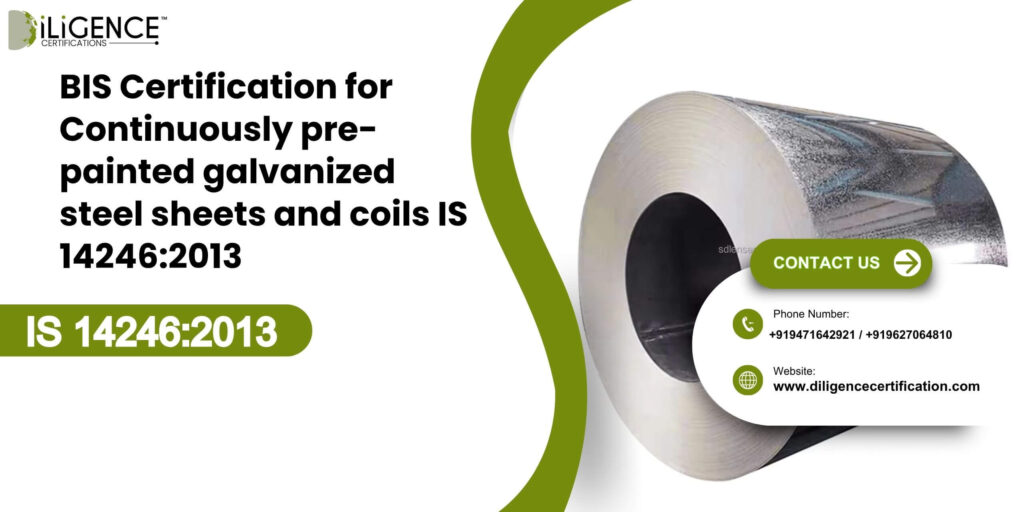- BIS certification under IS 14246:2013 is required by law for continuously pre-painted galvanized steel sheets and coils in India.
- It is a measure of the performance of the coating, the resistance to corrosion and the overall quality of the product.
- The process for certification comprises factory audits, product testing and regular BIS surveillance.
- Products with a license have an easier access to the market and are seen as more trustworthy by the buyers.
- Manufacturers are required to keep good laboratories, make proper markings and maintain documentation in order to be compliant.
Introduction

Once the Pune-based roofing sheet mfg. has lost a key contract due to the lack of BIS certification of their pre-painted galvanized coils as per IS 14246:2013. The client only accepted certified material and therefore rejected the non-certified one, which resulted in delays that were costly and the company’s reputation. These kinds of situations point out how important this certification has become in the Indian steel market. BIS certification is a must for implementing standard requirements regarding durability, corrosion resistance, and coating quality for continuously pre-painted galvanized metal sheet and coil. To the manufacturers, it is no more than a legal formality—it is a mark of trust and quality assurance that the buyers require. Bureau of Indian Standards
What is IS 14246:2013?
IS 14246:2013 is a detailed guide for water-stops made of rubber and PVC that are inserted in concrete structures to prevent water from leaking through the joints. The standard is intended to give such articles the strength, flexibility, and durability of the material required to provide a long-term watertightness solution in dams, tunnels, tanks, and the like.
Key Points:

- The standard specifies the features of water-stops made of rubber or PVC, or both.
- Materials-wise, it sets the features, dimensions, and limits of the products.
- It supports the enactment of tests for tensile strength, elongation, and aging. ISI MARK
- The standard illustrates the profiles that go with different types of joints (expansion, construction, etc.).
- Performance reliability is achieved through good marking, storage, and installation.
Why is BIS Certification Mandatory
BIS certification is a must in order to keep the standard of continuously pre-painted galvanized steel sheets and coils which are either sold or imported to India at a certain level. The Ministry of steel has issued a Quality Control Order (QCO) for this product, hence, compliance with IS 14246:2013 is mandatory for manufacturers and importers.
Key Reasons:
- Safety of consumer and quality guarantee: The measure is aimed at stopping the market of low-quality or unsafe steel products in those sectors which are very important like construction and infrastructure.
- Regulatory compliance: According to BIS Act, 2016 it is illegal to manufacture or sell these products without a valid BIS license.
- Market trust: The ISI mark is an assurance for buyers and project owners that the product complies with the national standards.
- Trade facilitation: Products that have been certified are less likely to face customs or procurement rejections in domestic and government tenders.
- Industry standardization: The uniformity in coating, durability, and corrosion resistance of the steel industry is at a certain level because of this.
Importance and Benefits of BIS Certification
| Importance | Benefits |
| Ensures product quality and safety compliance with Indian Standards | Builds customer trust and confidence in the brand |
| Mandatory for manufacturing and sale of regulated steel products | Enables legal market entry and avoids penalties |
| Promotes uniformity in product performance and durability | Reduces rejection risk in projects and tenders |
| Helps maintain consistent production and testing practices | Improves operational efficiency and quality control |
| Recognized by government and large infrastructure buyers | Increases market reach and competitiveness |
Step-by-Step Process of BIS Certification

Step1:Documentation
- Collect factory and product documents such as manufacturing licence and process details.
- Prepare technical specifications, test records, and factory ownership proof.
- Assemble QMS documents and calibration certificates for the measuring instruments.
- Verify all paperwork is complete and compliant with BIS guidelines.
Step2:Product Testing
- Bring product samples to a testing laboratory that is approved by BIS.
- Make sure that all the tests are performed according to the respective Indian Standard, for instance, IS 14246:2013.
- Offer the traceability of each sample along with the batch details.
- Obtain a full test report confirming conformity.
Step3:Application Submission
- Submit the application online through the BIS registration portal.
- Attach documents, test reports, and pay the required government fees.
- Choose the correct product category and standard code.
- Review all details before submission to prevent rework.
Step4:Scrutiny and Inspection
- BIS reviews the documents and testing information for accuracy.
- Inspectors visit the factory to verify manufacturing setup and quality control.
- Production process, lab facilities, and ISI marking are checked.
- Non-conformities, if any, must be corrected before approval.
Step5:Grant of License
- BIS issues the certification licence after successful inspection.
- The manufacturer can use the ISI mark on approved products.
- Licence includes product scope, standard reference, and validity period.
- Regular audits and renewals are required to maintain compliance.
Documents Required for BIS Certification
| Document | Description |
| Factory Licence | Proof of legal manufacturing unit |
| Process Flow Chart | Steps of production and quality checks |
| Product Test Report | From BIS-recognised laboratory |
| Quality Manual | Details of quality control and calibration |
| Equipment List | Machines and testing tools used |
| Authorisation Letter | If agent applies for manufacturer |
| Raw Material Certificates | Proof of material quality and source |
| Factory Layout & Utility Bill | Address and layout verification |
Timelines, Costs, Validity & Renewal
- Timelines: The whole process is done within 6–10 weeks, the time varies by testing and inspection.
- Costs: The costs are associated with application, testing, and marking, as per the standards set by BIS.
- Validity: The permit is valid for two years from the date of issuance.
- Renewal:Apply before expiry with updated reports and compliance proof.
Why Choose Diligence Certifications
- Expert support for BIS certification under IS 14246:2013 and other steel standards.
- End-to-end assistance from documentation to licence grant.
- Strong coordination with BIS officials for faster approval.
- Successfully accomplished projects with large-scale Indian manufacturers.
- An honest manner of carrying out the process, the provision of the time-bound updates, and being technically correct.
conclusion
BIS Certification for continuously pre-painted galvanized steel sheets and coils according to IS 14246:2013 is a must to guarantee product quality, safety, and adherence to regulations in the Indian steel industry. It allows producers to acquire trustworthiness in the market, correspond to customer requirements, and stay away from problems of law or customs. Through careful observance of the certification steps and sustaining the conformity all along, enterprises are able to consolidate their name and get access to the projects with a high market value. It is easier, hassle-free, and less prone to errors if you collaborate with Diligence Certifications as your guide on the way to achieving and keeping your BIS licence.
Frequently Ask Questions
What is IS 14246:2013?
It’s basically the Indian rules for how good pre-painted steel sheets and coils should be, making sure they're durable and don't rust easily.
Why do I need BIS for this?
BIS ensures these steel products meet the country's quality and safety standards. The steel peeps say you gotta have it.
Who needs to get BIS under IS 14246:2013?
If you're making, moving, or bringing these steel parts into India, you need a BIS license, whether you're an Indian company or from elsewhere.
Why bother with BIS?
It makes sure what you're selling is the real deal, lasts, and doesn't turn into a rusty mess. Plus, it stops people from buying junk.
What's the upside of getting BIS?
* You're doing things by the book (BIS Act, 2016)
* Your brand looks legit, and people trust you
* Easier to win bids and sell overseas
* Fewer products get turned away for being bad
* It proves you're consistent in what you do.
How long does BIS take?
Usually, it's about 6–10 weeks. It all depends on how quick you are with the paperwork, how long the testing takes, and when they can check out your place.
What papers do I need for BIS?
* Your factory permit and layout
* Test results from BIS-approved places
* A quality guide and papers for your equipment
* A process chart and equipment list
* Papers for the materials you use.
How long is a BIS license good for?
Two years. You gotta renew it before it ends by showing you're still following the rules and giving them updated test info.
What if I sell without BIS?
That's a no-go (BIS Act, 2016). You could get a fine, they could take your stuff, or shut you down.
How does BIS those who make things?
People have more trust in you, you're playing by the rules, and you can sell to more people, also helps you land those government gigs that need certified stuff.








 BIS Certification
BIS Certification
 CDSCO
CDSCO
 CPCB
CPCB
 LMPC
LMPC
 WPC Approval
WPC Approval
 Global Approvals
Global Approvals
 TEC
TEC
 ARAI
ARAI
 BEE
BEE
 ISO Certification
ISO Certification
 DGCA Certification
DGCA Certification
 NOC For Steel
NOC For Steel



















 Business Registration
Business Registration















 Legal Services
Legal Services
 Trademark Registration
Trademark Registration
 Copyright Registration
Copyright Registration
 Patent Registration
Patent Registration















































